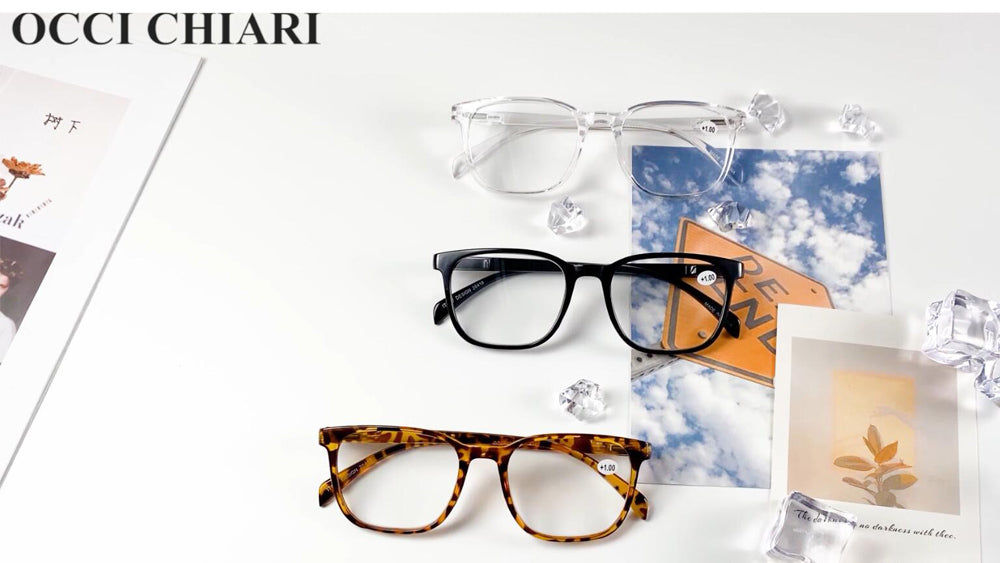Reading glasses are an essential tool for vision correction, especially as we age. The material of the lenses plays a significant role in the overall experience and effectiveness of the glasses. The two most common types of lenses available are glass lenses and resin lenses. Each comes with its own set of advantages and disadvantages, tailored to different needs. In this blog, we’ll break down the pros and cons of both materials to help you make the right choice.
Glass Lenses: The Classic, Durable Option
Advantages
-
Exceptional Optical Clarity
Glass lenses offer superior optical performance, providing crisp and clear vision. If you need precise vision correction, glass lenses are an excellent choice. -
Highly Scratch-Resistant
Thanks to their hardness, glass lenses are extremely resistant to scratches, maintaining their clarity over time even with regular use. -
Stable in Harsh Conditions
Glass lenses are highly resistant to temperature changes and humidity, ensuring they retain their shape and quality in various environments.
Disadvantages
-
Heavier Weight
Glass lenses are significantly heavier than resin lenses, which can lead to discomfort, especially with prolonged wear. -
Fragile and Breakable
Glass lenses are prone to shattering when dropped or hit, posing a potential safety hazard. -
Limited Design Flexibility
Due to the challenges of working with glass, lens designs and customization options are more restricted compared to resin lenses.
Resin Lenses: The Lightweight, Modern Choice
Advantages
-
Lightweight and Comfortable
Resin lenses are much lighter than their glass counterparts, making them more comfortable for extended wear. -
Enhanced Safety
Resin lenses are impact-resistant and less likely to break, making them a safer option for older adults and children. -
Versatile and Customizable
Resin is easy to mold, allowing for a wide variety of designs, colors, and coatings, such as anti-reflective or photochromic coatings. -
Natural UV Protection
Many resin lenses inherently block UV rays, offering added protection for your eyes.
Disadvantages
-
Less Scratch-Resistant
Resin lenses are softer than glass and more susceptible to scratches, though protective coatings can help mitigate this issue. -
Vulnerability to Environmental Changes
Resin lenses may warp slightly under high temperatures or in humid conditions, potentially affecting their performance. -
Slightly Lower Optical Clarity
While resin lenses have made great strides in clarity, they may not match the crystal-clear optics of glass lenses in certain situations.
How to Choose the Right Lens Material?
-
Prioritize Clarity and Durability: Go for Glass Lenses
If you value sharp vision and need lenses that can withstand wear and tear in stable environments (like indoors), glass lenses are a solid option. -
Prefer Lightweight and Safety: Opt for Resin Lenses
For those who wear glasses for extended periods or want a more secure option against accidental drops, resin lenses are a better fit. -
Need Special Features? Resin Lenses Win
Resin lenses are more versatile, offering a variety of functional coatings like blue-light blocking, UV protection, and color transitions. If these features are important to you, resin lenses are the way to go.
Conclusion
Both glass and resin lenses have their unique strengths and weaknesses, and the best choice depends on your individual needs, lifestyle, and budget. Glass lenses deliver unbeatable clarity and durability, while resin lenses excel in comfort, safety, and versatility.
When shopping for reading glasses, take the time to evaluate how and where you’ll use them. A well-chosen pair of lenses can make a world of difference in both comfort and functionality, keeping your vision sharp and your daily life hassle-free.
We hope this guide helps you make an informed decision. If you have any questions or personal experiences to share, feel free to leave a comment below!

